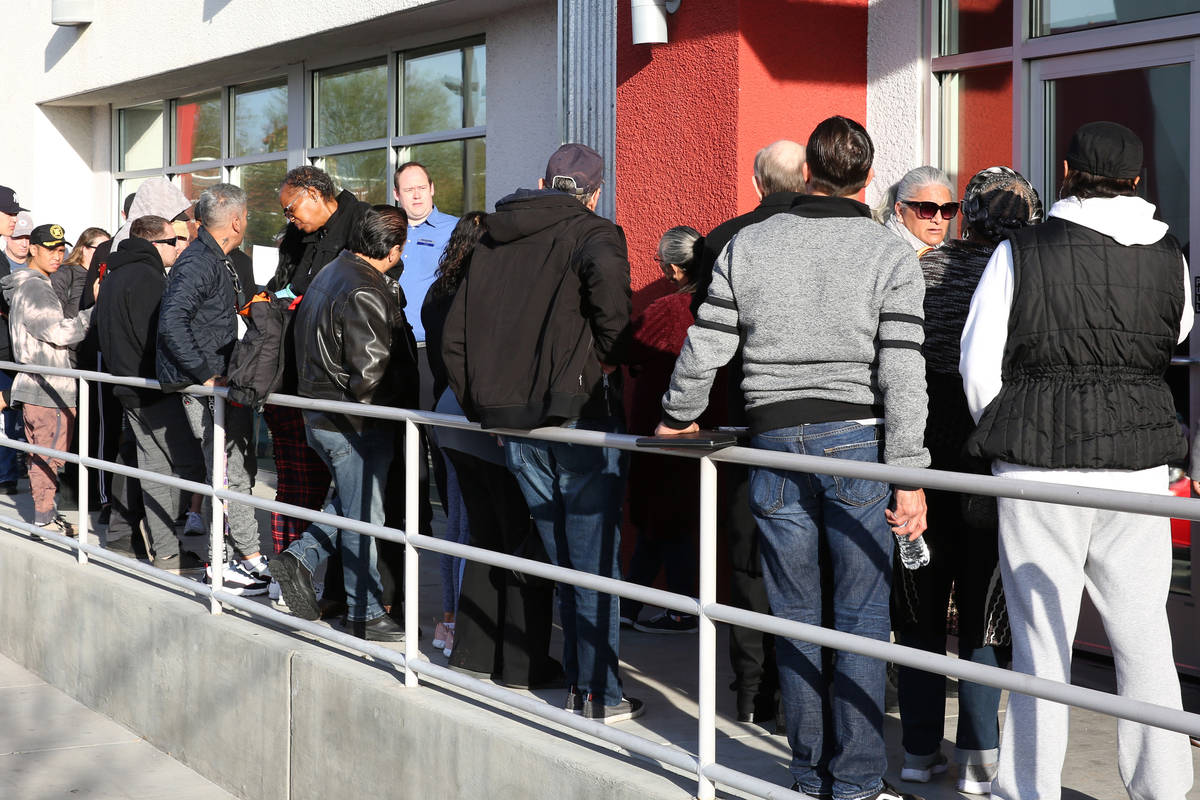Nearly 200K Nevadans to lose jobless aid day after Christmas
State workforce officials blasted congressional leaders and President Donald Trump on Christmas Eve for failing to deliver a stimulus package that would have extended jobless benefits.
The Consolidated Appropriations Act passed both houses of Congress on Monday, but President Donald Trump later aired grievances over the $900 billion emergency relief package in a video online, calling the legislation and a related bill as “a disgrace.”
Now, hundreds of thousands of Nevadans will see aid expire the day after Christmas.
“At this point, a gap in benefits has become virtually unavoidable for Nevadans,” said Nevada Department of Employment, Training and Rehabilitation Director Elisa Cafferata. “In all, 199,322 Nevadans stand to lose the benefits that they are getting now, or about two-thirds of those Nevadans who currently are getting some form of unemployment benefits.”
Cafferata said the agency was “fully preparing to implement” the provisions of the bill. “And with the latest actions in Washington, D.C., our hands are now tied we cannot implement these extensions without a signed bill, which we do not have,” she said in a press call.
Gov. Steve Sisolak said Trump’s “gamesmanship” will delay aid to jobless Nevadans.
“I was already frustrated with the late timing of this stimulus bill, but that frustration has only grown now that the President has created immense uncertainty on the future of this federal funding,” Sisolak said in a tweet. “His inaction and gamesmanship have put Nevada — and states across the nation — in an impossible situation. Unfortunately, and despite DETR’s hard work, Nevadans will suffer because of the failures in Washington, D.C., to act in a timely manner.”
Day after Christmas
The Pandemic Unemployment Assistance program has allowed independent contractors and self-employed workers to claim unemployment insurance, and the Pandemic Emergency Unemployment Compensation program has added up to 13 weeks of additional unemployment benefits to people who previously collected state or federal unemployment compensation but exhausted those benefits.
Both programs expire the day after Christmas.
“These are temporary programs put into place during the pandemic, but they’re set by law to end on Dec. 26,” Andrew Stettner, a senior fellow at the Century Foundation, previously told the Review-Journal. “It’s coming at a very bad time.”
The 5,593-page bill passed by Congress would have added 11 weeks of eligibility to the PUA program and 11 weeks to the PEUC program. DETR reported 78,922 people are receiving PUA payments and 99,474 are receiving PEUC payments as of last week.
Uncertainty for states
Barbara Buckley, head of Sisolak’s rapid response team on unemployment, said Thursday that Nevada families will face “unbelievable hardship as their unemployment benefits stop on Saturday.”
Congress and Trump, she said, “have had months to act.”
But even if the $900 billion package is signed into law, state agencies would still need to wait for guidance from the U.S. Department of Labor to implement unemployment extensions, which could take 10 days after the bill is signed into law.
“Right now we’re looking at the new year before we get the guidance,” Cafferata said.
The agency also would await guidance from federal labor officials on overpayment waivers.
Many PUA recipients have received notices that they owe money back to the employment agency. Reasons can include failing to report earnings or income and errors made by DETR, according to the state website.
Latest figures from the U.S. Department of Labor report Nevada made an estimated $30.7 million in improper payments or overpayments last year.
Those who receive overpayment notices are required to pay back their benefits under Nevada law.
State agencies may waive PUA overpayments if it is determined the payments were made “without fault on the part of any such individual; and such repayment would be contrary to equity and good conscience,” according to the bill’s text.
“Again, here’s where we need guidance: We don’t know what the definitions are for ‘equity and good conscience,’ and that impacts our ability to provide those waivers. We don’t know if people have to apply or if we can sort of proactively do that in certain cases,” Cafferata said.
But for the nearly 200,000 Nevadans impacted by Saturday’s cutoff, Buckley said filers should reach out to nonprofit agencies and other organizations for immediate assistance.
“We urge families to call 2-1-1,” Buckley said of the program offered by the state Department of Health and Human Services to connect people to resources. “We urge them to reach out to some of those resources while we hope that Congress and the president get us the relief that we need.”
Contact Jonathan Ng at jng@reviewjournal.com. Follow @ByJonathanNg on Twitter.






















